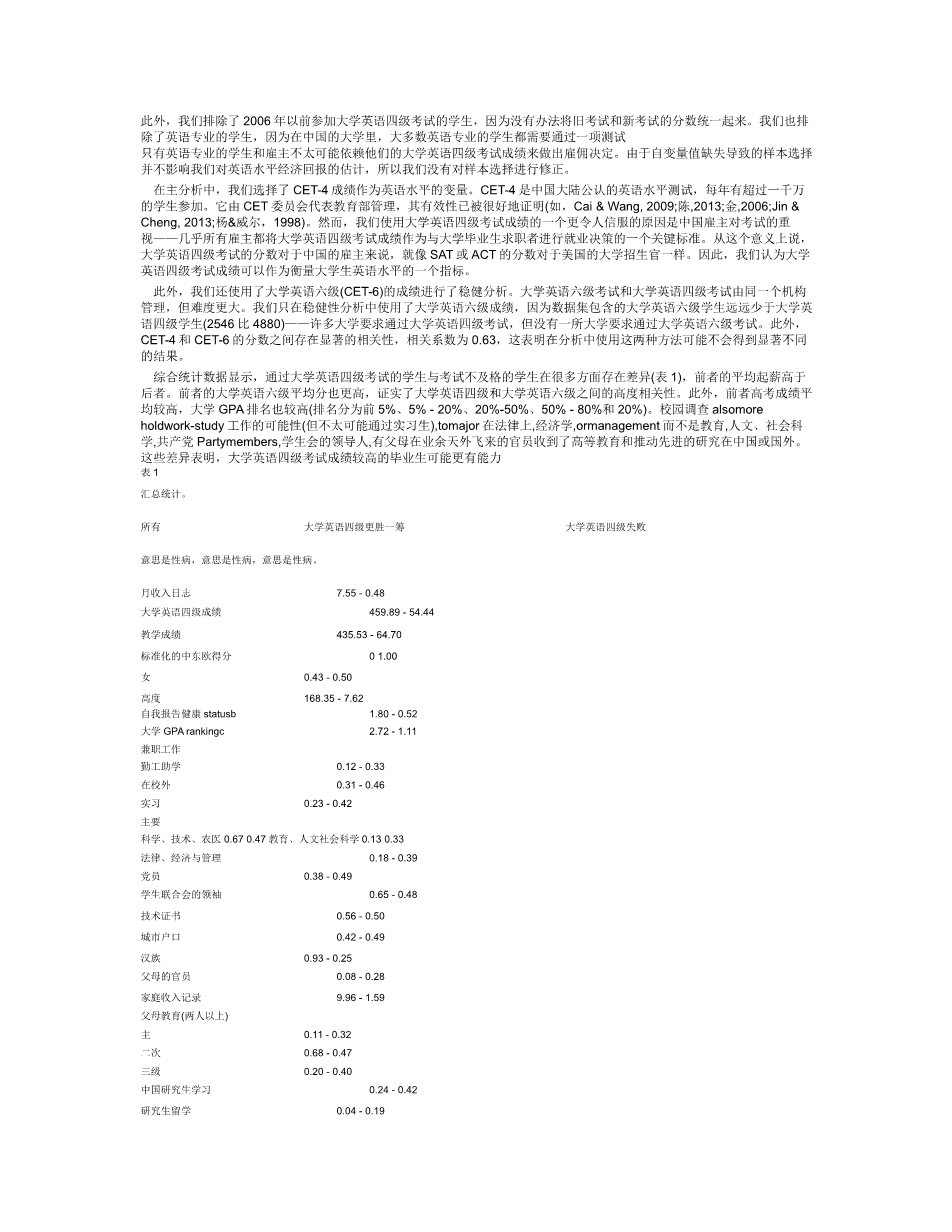Economic Returns to English Proficiency for College Graduates in Mainland China
|
Article history: Received 2 March 2014 Received in revised form 7 July 2014 Accepted 28 July 2014 Available online 7 August 2014 |
The present study examines the economic returns to English proficiency for college graduates in Mainland China, paths through which English proficiency may affect earnings, and possible moderation effects and crowding-out effects of English proficiency on other human capital. The analysis results indicate that English proficiency had significant effects on college graduates starting salaries, their probability of changing permanent residence status from rural to urban, and their future earning potential. Possible reasons for the economic returns to English proficiency include increased chances of working in the employment sector where the average income was higher than in the other sectors and improved opportunities of landing job interviews. English proficiency may mitigate the effects of GPA rankings on salaries. Meanwhile, it did not seem to have been achieved at the expense of other important human capital investments. The results have policy implications as well as contributing to the literature. |
1. Introduction
As increasing globalization accelerates the demand for employees with English skills, English learning plays a vital role in secondary and tertiary education in China. English language is one of the three major subjects tested on the college entrance examination (CEE); many colleges require that their students pass the College English Test-Band 4 (CET-4) for college degrees; and college grad-uateswho opt to pursue advanced studies have to pass the graduate admission examination, of which a test of English is an important component.
Meanwhile, employers have attached great value to English proficiency aswell, with CET-4 scores as a proxy, to the extent that the National College English Testing Committee is concerned about this unintended use of the test. According to both former chair and current chair of the CET committee, CET-4 certificates have served as a nationally recognized, and inmany cases an indispensable, education credential for employment of college graduates. CET-4 scores may determine whether a college graduate can locate a desirable job and, in some cases, even whether one is eligible for permanent residence, or hukou, in some major cities (Jin, 2008; Yang, 2003). In a survey of about 500 CET-4 test-takers, the respondents in general believed that CET-4 scores were more important for job-hunting than for any other purpose, with an overall average score as high as 5.41 on a scale of 6 (Jin amp; Cheng, 2013).
Recently, however, there have been attempts in China to counteract the (over)emphasis on English education. Beijing, for instance, is planning to reduce the weight of English proficiency tests in both the high school entrance examination and the college entrance examination from 2016 on. Against this background, it is important to investigate the relationship between English proficiency and earnings.
English proficiency is a type of human capital. Since human capital might positively impact earnings (e.g., Mincer, 1974; Mincer amp; Polachek, 1974), it is generally assumed that English proficiency should have a positive effect on starting salaries of college graduates in China. However, quantitative studies are lacking to substantiate the assumption. High English proficiency could add to college graduates competitive edges but more time spent on English learning could mean less time for other courses or activities that might improve their earning potential, leaving the net economic returns to English proficiency uncertain.
Research on economic returns to language proficiency is now concentrated in developed, English-speaking countries and can be divided into two major groups. Some researchers examined the effect of English proficiency on the income of immigrants in English-speaking countries. For instance, Chiswick andMiller (2002) found that, among immigrants whose first languagewas not English, those fluent in English on average earned 14% more than those not fluent. Other researchers investigated the effects of foreign language proficiency on income in English-speaking countries and generally detected negative effects (Gabe, 2009; Li, 2001; Shin amp; Alba, 2009). For example, Shin and Alba (2009) found that children of Chinese andMexican immigrants whowere bilingual (English plus native language) earned less than their counterparts who spoke only English. To the best of our knowledge, no study has looked into the economic returns of English proficiency in non-English-speaking, developing countries.
With the large number of students graduating from college in China each year – 6.99million students in 2013, accounting for over half of the new employment inflows (Ministry of Education of the Peoples Republic of China, 2012), it is worthwhile to analyzewhat factors might have an impact on college graduates earnings. Scholars have examined the economic returns in China to schooling (Chenamp;Hamori, 2009; Li, Liu, amp; Zhang, 2012;Mishra amp; Smyth, 2013; Zhang, Zhao, Park, amp; Song, 2005), Communist Partymembership (Li, Liu, Zhang, amp; Ma, 2007), parents political capital (Yang, Wang, amp; Liu, 2010), attending elite colleges (Li, Liu, et al., 2012; Li, Meng, Shi, amp;Wu, 2012), studying abroad (Li, 2004), and entering different employment sectors (Liu, Zhang, amp; Chong, 2004). However, only Li, Meng, et al. (2012) focused on college graduates (as data on college graduates in China have only recently become available) and none of these studies examined the effects of English proficiency on income despite the importance attached to English by educators and employers alike.
In this paper, therefore, we investigated the economic returns
剩余内容已隐藏,支付完成后下载完整资料


英语译文共 12 页,剩余内容已隐藏,支付完成后下载完整资料
资料编号:[609784],资料为PDF文档或Word文档,PDF文档可免费转换为Word
课题毕业论文、文献综述、任务书、外文翻译、程序设计、图纸设计等资料可联系客服协助查找。


